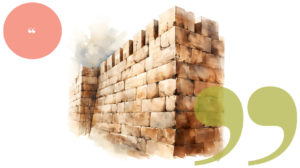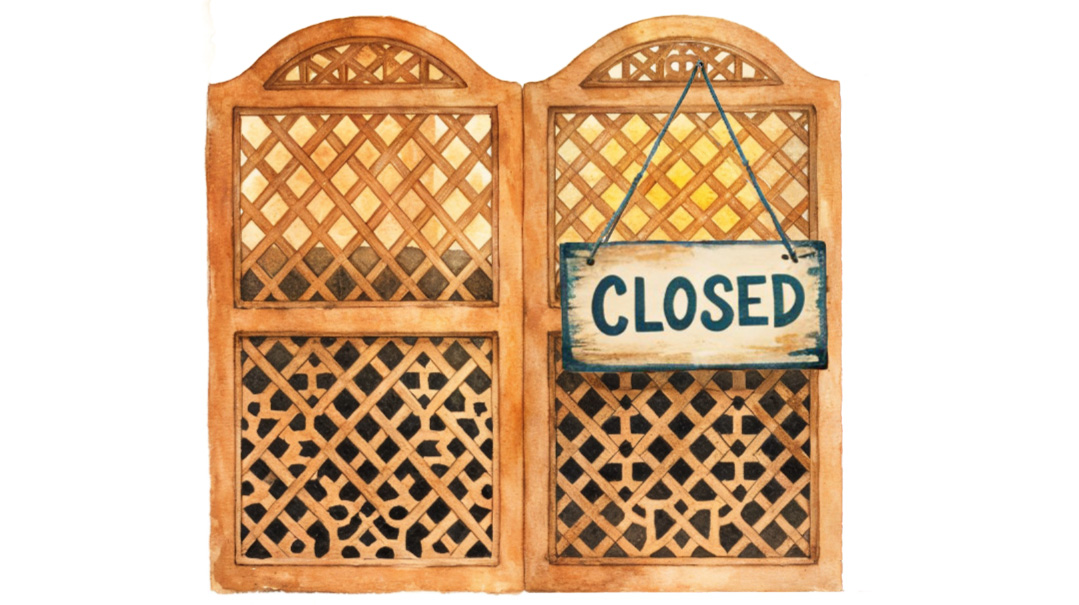A Meager, Marvelous Offering

“How many difficult moments have you faced — and then risen above them with every ounce of self-control you could muster?
“Why do I put myself through this?” my friend Rochel asked no one in particular. She buckled her seatbelt and shook her head. “Every time I go, I come home depressed.”
“You too?” Shifra blurted out, struggling to fit herself into my four-year-old’s booster seat.
“That makes me feel better.” Tali flicked away some dried-out baby wipes to create a seat for herself. “I was actually debating whether to come for just this reason.”
I nodded gratefully. Oh, the joy of shared misery!
Joined by a few neighborhood women, I’d gone to a seminary alumnae shiur delivered by a master mechaneches and rebbetzin. We listened, we absorbed — tried to stifle a yawn here and there and suppress thoughts about laundry piled on the couch — and were blown away. As usual, the content and presentation left you breathless, unveiling core Torah concepts and their universal applicability with breathtaking scholarship and awe-inspiring conviction.
Then our group ambled back to the car. There was a sad sort of quiet, followed by Rochel’s confession — and car-wide relief. I swung onto the highway, and four generally loquacious ladies seemed locked in thought.
“Every time I attend the shiur, I come home in a bad mood,” Rochel continued, ignoring the incessant ring of her cellphone. “Look where I used to be — the ideals, the visions, the lofty Torah thoughts — and where I am today. Know what I mean?”
We knew exactly what she meant.
Struggling to get through bedtime without screaming.
Fighting to stay calm on Erev Shabbos.
Battling to be respectful when Husband disappointed us yet again.
Pushing ourselves to check the barley even though it probably didn’t have bugs.
The schism between our seminary existence and our present lives was so big, so intimidating, and so unbridgeable that you couldn’t help but feel depressed.
“Maybe it’s good to feel a little down occasionally,” Shifra suggested, shrugging her shoulders. “Maybe the gap motivates us to try harder.”
Silence.
That theory didn’t really resonate with anyone. I turned on the music.
Three months later, I got a phone call updating me about the next shiur. After a brief — very brief — inner debate, I opted out. Too much to do, too many work commitments, baby will wake up, yada yada.
Who was I kidding? I’d lost cheishek. Precisely because the shiurim were so magnificent, and were held in a classroom that had nurtured so many hopes and dreams, the disparity was too painful. Where had that bright-eyed, sincere-to-a-fault, ready-to-conquer-the-world girl gone? Where was that girl who had spent whole afternoons in the beis medrash, poring over seminal texts and feeling sweet satisfaction? Where was the girl who had spent an hour on shacharis, who felt invigorated and energized after talking to Him? I was disillusioned — with the system, and with myself.
I poured out my heart to a wise older friend. She sympathized, then told me I had it backwards. “Who were you in seminary?” she wanted to know. “What challenges did you face, what struggles did you overcome? What thorny relationships did you have to navigate, which major conflicts were you forced to resolve?”
Not very many, I admitted. And certainly nothing of lifetime consequence.
“Look at yourself today,” she pressed. “How many difficult moments have you faced — and then risen above them with every ounce of self-control you could muster? How many conversations have you had with dignity and respect, despite the rage and frustration? How much sweat have your poured into your marriage, your child-raising, when no one was around to applaud you or appoint you as class representative? How many tears have you cried, asking Him to take your hand?
“This, my dear, is the real thing. In school and seminary, you studied Torah. Today, you are living it.”
I listened. I let the relief overwhelm me.
Where am I today? I know exactly where. I have been sent out of the Garden of Eden. I am no longer a neshamah’leh being spoon-fed by angelic mentors. I no longer merit prophetic visions in the Red Sea, nor miracles of historic magnitude. The bliss of shanah rishonah has long dissipated, giving way to misunderstandings and misgivings and inertia.
Now I am an ever-so-fallible human in a dry, brutal desert. My set of luchos are crude and homely and uninspiring; they were not hand-hewn by G-d, nor delivered amidst thunder and lightning.
But — like the imperfect stone tablets residing in the holiest spot on earth — they are the ones that will forever remain whole.
(Originally featured in Family First, Issue 442)
Oops! We could not locate your form.













